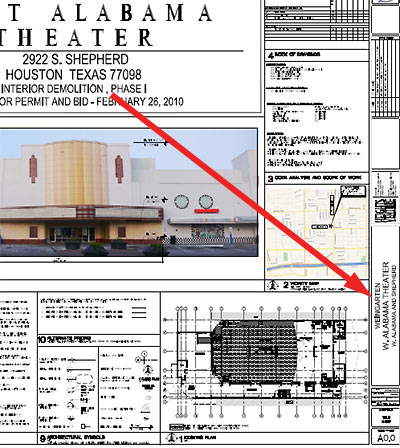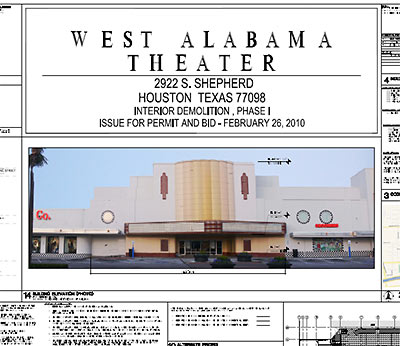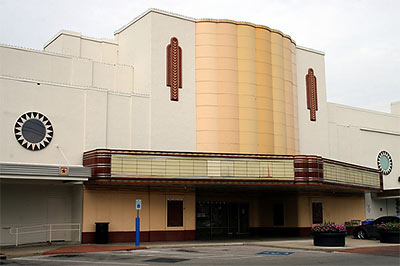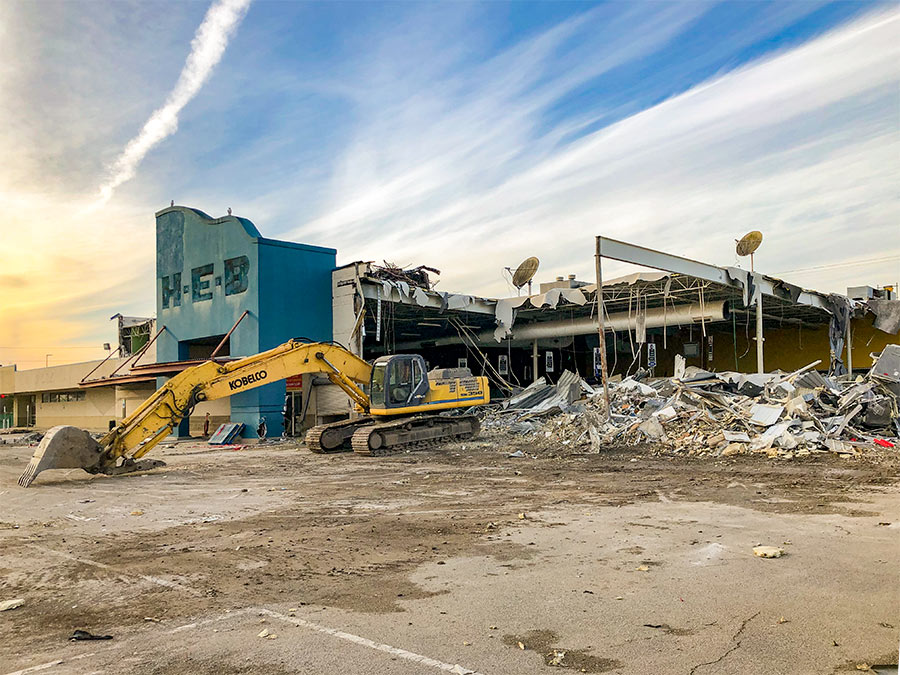
Today’s Houston Business Journal features a rather surprising statement from a Weingarten Realty executive about the company’s recent plans for the vacant Alabama Theater. Late last month you’ll remember, Swamplot broke the story that a local construction company was obtaining bids from subcontractors for an extensive interior demolition of the vacant 1939 Art Deco movie theater at 2922 South Shepherd Dr. — using drawings prepared for Weingarten Realty by a local architecture firm.
Since that time, representatives of Weingarten, a publicly traded REIT, have been pushing back on the story to local reporters with a series of carefully worded statements. One such statement, delivered to both Swamplot and its readers the same day the story broke, by a spokesperson under contract to Weingarten, was typical: Weingarten, Swamplot was told, “can’t verify the authenticity of the drawings you posted on your blog one way or the other.”
Aw, shucks. And yet — if this statement in today’s HBJ is to be believed — it appears they certainly could have verified them:
Patti Bender, executive vice president with Weingarten, says the preliminary design that recently hit the streets was part of a site pricing analysis conducted by Staples.
Oh . . . does that mean Weingarten had no part in producing those drawings that showed exactly how the theater was to be gutted and its sloping floor encased in concrete? It was all Staples’s doing? Of course, those of you who have been following the story here on Swamplot realize there are just a couple problems with that statement:
***
- Though the bid documents included a separate set of drawings showing a prototypical 18,000-sq.-ft. Staples office-supply store, and the construction firm used the Staples name to identify the project, the drawings detailing the interior demolition were clearly labeled with Weingarten’s name as the client (see image above) — not that of any potential tenant.
- The drawings, which were prepared by Heights Venture Architects, were neither labeled as a pricing set nor as “preliminary” — conventional practice when that is the actual case. They were labeled “Issue for Permit and Bid.” Here’s another portion of the cover sheet:

Last week, after sensing local reaction to the idea that the theater might be gutted, Staples announced that it was no longer interested in leasing the former Alabama Bookstop location. But readers rooting for an Alamo Drafthouse to move in instead — the new owners of the Houston franchise for the Austin-based movie-theater-and-restaurant chain reported they had recently restarted discussions with Weingarten about the property — may want to take note of a further statement Bender makes to Jennifer Dawson in today’s HBJ:
“We’re not working on a lease with anyone right now,†says Bender.
Does that mean the Alamo won’t be coming to the theater’s rescue? Not exactly. Here’s an expanded translation, for those of you not familiar with how it’s clear such statements from the company need to be parsed: “We could be thinking about signing a lease, negotiating to sign a lease, ready to sign a lease, have an agreement to sign a lease, have already signed a lease, or [more likely] have no reasonable prospects of leasing the property in the near future. But certainly, we’re not working on a lease with anyone — at the moment.”


- Old Alabama looks for help from Alamo [Houston Business Journal]
- Alabama Theater coverage [Swamplot]
Excerpts from issued demolition plans for Alabama Theater: Heights Venture Architects. Photos: Flickr user mlsnp (interior); Chris Adams (exterior)





Apparently neither company wants to take responsibility (anf the heat) for destroying this beautiful interior.
I don’t totally understand Weingarten’s defensiveness here. After all, they totally earned the wrath of people in the community who would like to see older, architecturally significant buildings preserved in some fashion when they tore down the north side of the shopping center at Shepherd and Gray. They made a calculation then that peoples’ upset feelings would not outweigh the financial benefit.
Given this, why do they care what people think now? Did the negative publicity before actually hurt them in any material way? (I’ve made a point of not shopping at the new B&N even though I am a compulsive book-buyer, but I have no illusions that me and people like me have any impact on their bottom line.)
This is turning into Wilshire II
I love Weingarten’s response to the Staples statement:
“We understand the public’s interest in the future of the Alabama Theater, but speculation about every prospective tenant is not productive to the community or to the process of securing a tenant who will make a contribution to Houston in tangible ways–sooner rather than later. ”
I’d hate to see Weingarten’s version of a “tangible” contribution.
You know what, Weingarten folks? Honesty IS an option.
Bender went on to say:
“B-E-N-D-E-R!! Beeeeeennnnder! B-E-N-D-E-R!! Beeeeeeennnder!! BEE!! ENNN!! DEEE!! EEE!! ARRR!!”
Oops. I fail.
while i like the theater and loved going to bookstop as a kid, it’s Weingarten’s property and it can do with the property as it sees fit. that’s why i love houston–capitalism at work. i don’t understand the hatred towards reasonable business men.
“Reasonable” business men don’t tear down a unique property that attracted a usually upscale clientele and replace it with cookie cutter, passe in 15 years architecture. Very short-sighted.
htownproud: Of course Weingarten has the right to do whatever they want with the property they own within the limits of the law. But just because they have a right to do so doesn’t mean it’s the right thing to do. I mean, I have the right guaranteed by the constitution to put up a sign on my front yard that reads “All white babies are pigs.” But doing so would obviously be evil. Not ever decision a capitalist enterprise makes is a moral one (at least, not in any moral universe outside of Ayn Rand).
The decent thing to do here is for Weingarten to work very hard to find a profitable use for the space that doesn’t involve destroying it (and to be forthright in communicating with the public).
I’m guessing that if the leak hadn’t happened, Weingarten would have quietly gutted it, leveled the floor, and rented it to Staples. If it didn’t work out with Staples, then some other suburban big-box. Now that it’s out there, they have to backpedal without saying anything like they are committed to preserving this important and beautiful structure.
The city should just buy this property and turn it into a public event space. It wouldn’t be terribly difficult to reinstall the projection booth and it could be used for anything from presentations to theater. It’s a much more beautiful building than the River Oaks and hasn’t been destroyed like the Tower.
With that in mind, if you want to know what the Alabama will look like gutted just go look in the recently closed Hollywood Video that used to be the Tower Theatre.
If I was Houston Real Estate Czar (I dream), I’d refurbish the theatre and raze the rest of the mall (for parking.)
Then prospective tenants would come calling.
Houston: No Past, No Future. Make as much money as you can in the oil business or as a physician at the medical center and get the hell out. Sorry, guys. It’s true.
Kirston,
As I and others have posted; yes, it would be a great movie theatre. As with many purpose-built movie theatres, it does not have the kind of support spaces such as dressing rooms that live theatre requires. Retrofitting that would be expensive and also might mean moving the back “screen” wall far enough forward that it would mess up the geometry for movies.
Houston is the worst example of capitalism at work. Zoning is a great tool to preserve historic buildings as well as plan future development in a city. Cities like New York or Chicago are good examples of how zoning works to build a stronger real-estate market. We all understand Weingarten is a company that is in business to make money, but do they need to do so at the cost of our city’s history? I would not be surprised if Staples was willing to lease the space with the interior intact, but Weingarten is most likely looking to increase the bottom line by installing new HVAC and electric improvements that will save them money in utility costs.